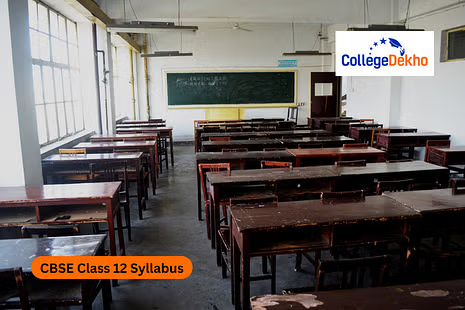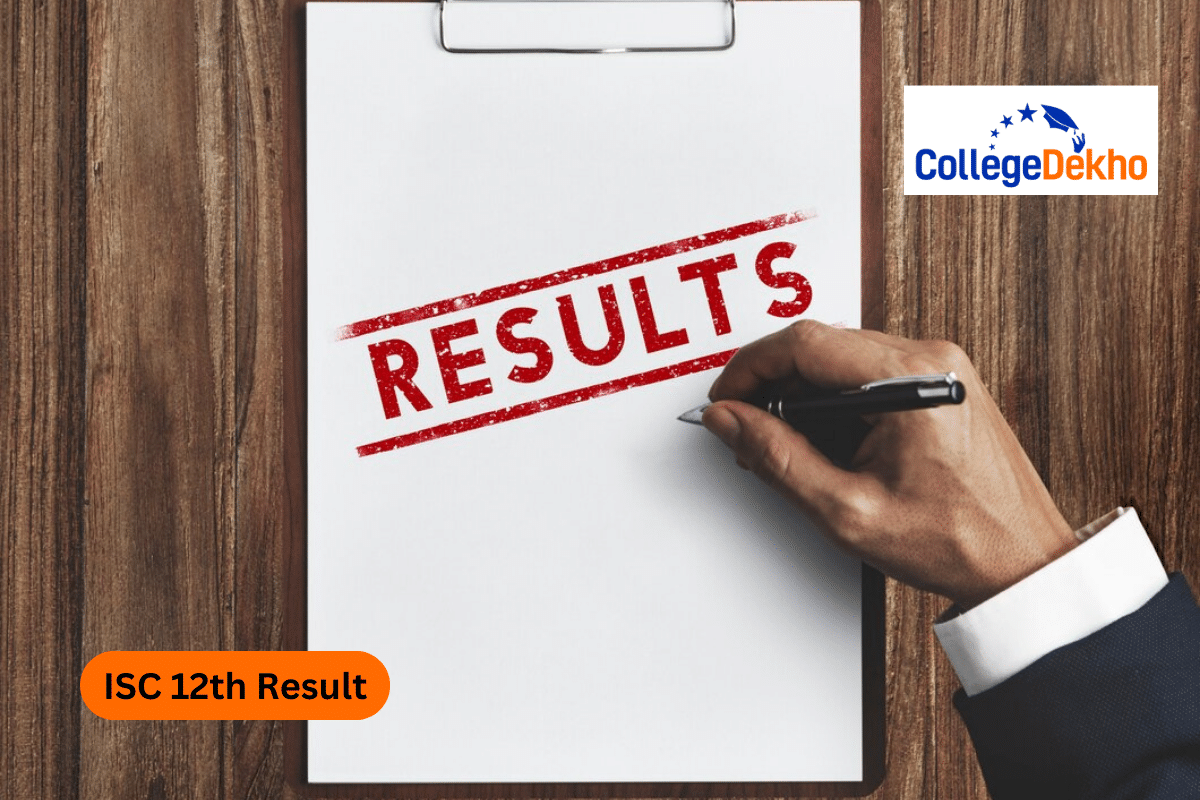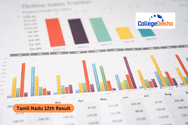CBSE Class 12 Syllabus 2024-25 has been uploaded on the official website of the Central Board of Secondary Education. Students can check the marks distribution for each of the topics in all subjects using the syllabus PDF.
- About CBSE Class 12 Syllabus 2024-25
- CBSE Class 12 Syllabus 2024-25 Latest Updates
- CBSE Class 10 Syllabus for all Subjects 2024-25 – Download …
- CBSE Class 12 English Syllabus 2024-25
- CBSE Class 12 English Elective Syllabus 2024-25
- CBSE Class 12 Commerce Syllabus 2024-25
- CBSE Class 12 Arts Syllabus 2024-25
- CBSE Class 12 Science Syllabus 2024-25
- CBSE Class 10 Syllabus 2024-25: Prescribed Books
- Benefits of Knowing the Class 10 CBSE Board Syllabus
- CBSE Class 10 Syllabus 2024-25: Preparation Tips
- CBSE Class 12 Deleted Syllabus 2024-25
- CBSE Class 12 Subject Group
- Faqs


Never Miss an Exam Update
About CBSE Class 12 Syllabus 2024-25
The Central Board of Secondary Education has released the CBSE Class 12 Syllabus 2024-25. The students can visit the official website, cbse.nic.in, and download the syllabus. CBSE Class 12 Syllabus 2024-25 encompasses seven major learning areas, which are: Languages, Humanities, Mathematics, Sciences, Skill Subjects, General Studies, and Health and Physical Education. Languages include Hindi, English, and other 34 languages. Students have to choose a minimum of five subjects with one additional subject. Hindi or English must be one of the two languages to be studied in classes XI and XII. The theory paper for most of the subjects will be structured for 80 marks. Students can download the subject-wise syllabus in PDF by clicking on the subject links. After going through the syllabus, students can start preparing for the exams. Also Read: CBSE Class 12 Exam Pattern 2024-25
CBSE 12th Board 2025 will begin on February 15, 2025 and end on April 4, 2025. CBSE Class 12 Date Sheet 2025 was released by CBSE on November 21, 2024. In addition to the syllabus, students can also download marking schemes for all subjects covered in Group L and Group A from the CBSE’s official website. The students can check out more information related to CBSE Class 12th Syllabus 2024-25 from the article given below:
CBSE Class 12 Syllabus 2024-25 Latest Updates
- April 2, 2025 - The board has revised the syllabus for 2025-26 session. Students can check the updated syllabus here soon.
- Nov 21, 2024: CBSE Board released the Class 12 Exam Date 2025 as per which the Class 12 exam 2025 will be held from Feb 15, 2025 till April 4, 2025.
CBSE Class 10 Syllabus for all Subjects 2024-25 – Download Syllabus
Given below are the links for the CBSE Class 12th Syllabus 2024-25 for all subjects. Students can click on the link and download CBSE Class 12th Syllabus 2024-25:
List of CBSE Class 12th Syllabus Subjects 2024-25 | Links to Download PDF |
|---|---|
| Download Link | |
| CBSE Class 12 English Elective Syllabus 2024-25 | Download Link |
| Hindi Core | Download Link |
| Hindi Elective | Download Link |
CBSE Class 12th Bio-Technology Syllabus 2024-25 | |
CBSE Class 12th Engineering Graphics Syllabus 2024-25 | |
CBSE Class 12th Entrepreneurship Syllabus 2024-25 | |
CBSE Class 12th Fine Arts Syllabus 2024-25 | |
CBSE Class 12th Home Science Syllabus 2024-25 | |
CBSE Class 12th Informatics Practices Syllabus 2024-25 | |
CBSE Class 12th Applied Mathematics Syllabus 2024-25 | |
CBSE Class 12th NCC Syllabus 2024-25 | |
CBSE Class 12 English Syllabus 2024-25
Students can refer to the detailed information about the Literature syllabus presented by CBSE for English Core from the table given below:
| Flamingo | |
|---|---|
| Prose | The Last Lesson |
| Lost Spring | |
| Deep Water | |
| The Rattrap | |
| Indigo | |
| Poets and Pancakes | |
| The Interviews | |
| Going Places | |
| Poems | My Mother at Sixty-Sic |
| Keeping Quiet | |
| A Thing of Beauty | |
| A Roadside Stand | |
| Aunt Jennifer's Tigers | |
| Vistas | The Third Level |
| The Tiger King | |
| Journey to the End of the Earth | |
| The Enemy | |
| On the Face of it | |
| Memories of Childhood – The Cutting of My Long Hair, We Too Are Human Beings | |
Also Read: CBSE Class 12 English Sample Paper 2025
Internal Assessment
A total of 20 marks are allotted for the internal assessment.
- Assessment of Listening Skills - 05 marks.
- Assessment of Speaking Skills - 05 Marks
- Project Work - 10 Marks
Also Read: CBSE Class 12 English Previous Year Question Paper
CBSE Class 12 English Elective Syllabus 2024-25
Students can check the table given below to learn more about the English elective literature syllabus and prepare for the exams accordingly:
Book | Category | Titles |
|---|---|---|
Kaleidoscope-Short Stories | Stories | - I Sell My Dreams |
- Eveline | ||
- A Wedding in Brownsville | ||
Kaleidoscope-Poetry | Poems | - A Lecture Upon the Shadow |
- Poems by Milton | ||
- Poems by Blake | ||
- Kubla Khan | ||
- Trees | ||
- The Wild Swans of Coole | ||
- Time and Time Again | ||
Kaleidoscope-Non fiction | Essays | - Freedom |
- The Mark on the Wall | ||
- Film-making | ||
- Why the Novel Matters | ||
- The Argumentative Indian | ||
Kaleidoscope-Drama | Play | - Chandalika - RABINDRANATH TAGORE |
CBSE Class 12 Commerce Syllabus 2024-25
The Commerce stream of CBSE Class 12 comprises the main subjects such as Accountancy, Economics, Business Studies, Statistics, Finance and so on. Here we have given the included topics, weightage, and mark distribution for each subject in Commerce stream.CBSE Class 12 Accountancy Syllabus 2024-25
Students can check out the detailed information about the Accountancy syllabus from the table given below:
Units | Chapters |
|---|---|
Part A: Accounting for Partnership Firms and Companies | - |
Unit 1. Accounting for Partnership Firms | Partnership Goodwill Change in the Profit Sharing Ratio among the existing partners Admission of a partner Retirement and death of a partner Calculation of the deceased partner’s share of profit till the date of death Preparation of deceased partner’s capital account and his executor’s account. Dissolution of a partnership firm |
Unit 2. Accounting for Companies | Accounting for Share Capital Accounting for Debentures |
Part B: Financial Statement Analysis | - |
Unit 3. Analysis of Financial Statements | Financial statements of a Company Statement of Profit and Loss in Balance Sheet |
Unit 4. Cash Flow Statement | Meaning, objectives Benefits, Cash and Cash Equivalents, Classification of Activities and preparation |
CBSE Class 12 Accountancy Syllabus 2024-25 for Project Work
Project Works that includes the topics of CBSE Class 12 Accountancy Syllabus 2024-25 are as follows:One specific project based on financial statement analysis of a company covering any two aspects from the following:
1. Comparative and common size financial statements
2. Accounting Ratios
3. Segment Reports
4. Cash Flow Statements
Also Read: CBSE Class 12 Accountancy Sample Paper 2024-25
CBSE Class 12 Business Studies Syllabus 2024-25
The theory paper in Business Studies will be conducted for 80 marks and 20 marks will be allotted for the practical exam. Check the information about the detailed syllabus here here:
Units | Chapters |
|---|---|
Part A: Principles and Functions of Management | |
1. Nature and Significance of Management | Management - concept, objectives, and importance Management as Science, Art and Profession Levels of Management Management functions-planning, organizing, staffing, directing and controlling Coordination- concept and importance |
2. Principles of Management | Principles of Management - concept and significance Fayol’s principles of management Taylor’s Scientific management - principles and techniques |
3. Business Environment | Business Environment- concept and importance Dimensions of Business Environment - Economic, Social, Technological, Political and Legal Demonetization - concept and features |
4. Planning | Planning: Concept, importance and limitation Planning process Single use and Standing Plans. Objectives, Strategy, Policy, Procedure, Method, Rule, Budget and Programme |
5. Organising | Organising: Concept and importance Organising Process Structure of organisation- functional and divisional concept. Formal and informal organization - concept Delegation: concept, elements and importance Decentralization: concept and importance |
6. Staffing | Staffing: Concept and importance of staffing Staffing as a part of Human Resource Management concep Staffing process Recruitment process Selection – process Training and Development - Concept and importance, Methods of training - on thejob and off the job - vestibule training, apprenticeship training and internship training |
7. Directing | Directing: Concept and importance Elements of Directing Motivation - concept, Maslow’s hierarchy of needs, Financial and non-financial incentives Leadership - concept, styles - authoritative, democratic and laissez faire Communication - concept, formal and informal communication; barriers to effective communication, how to overcome the barriers? |
8. Controlling | Controlling - Concept and importance Relationship between planning and controlling Steps in process of control |
Part B: Business Finance and Marketing | |
9. Financial Management | Financial Management: Concept, role and objectives Financial decisions: investment, financing and dividend - Meaning and factors affecting Financial Planning - concept and importance Capital Structure – concept and factors affecting capital structure Fixed and Working Capital - Concept and factors affecting their requirements |
10. Financial Markets | Financial Markets: Concept Money Market: Concept Capital market and its types (primary and secondary) Stock Exchange - Functions and trading procedure Securities and Exchange Board of India (SEBI) - objectives and functions |
11. Marketing Management | Marketing – Concept, functions and philosophies Marketing Mix – Concept and elements Product – branding, labelling and packaging – Concept Price - Concept, Factors determining price Physical Distribution – concept, components and channels of distribution Promotion – Concept and elements; Advertising, Personal Selling, Sales Promotion and Public Relations |
12. Consumer Protection | Consumer Protection: Concept and importance The Consumer Protection Act, 2019: Meaning of consumer Rights and responsibilities of consumers Who can file a complaint? Redressal machinery, Remedies Available Consumer awareness - Role of consumer organizations and Non-Governmental Organizations (NGOs) |
CBSE Class 12 Business Studies Syllabus 2024-25 for Internal Assessment
| Initiative, Cooperativeness and participation | 2 marks |
|---|---|
| Creativity in presentation | 2 marks |
| Content, observation and research work | 4 marks |
| Analysis of situations | 4 marks |
| Viva | 8 marks |
| Total | 20 marks |
Also Read: CBSE Class 12 Business Studies Sample Paper 2024-25
CBSE Class 12 Arts Syllabus 2024-25
The CBSE 12th Arts stream includes subjects like Geography, History, Sociology, Political Science, and Home Science. Students can go through the topics and marks weightage of all the subjects below.CBSE Class 12 Economics Syllabus 2024-25
Students can check the information about the topics that are allotted for every unit included in the Economics syllabus from the table given here:
Part A: Introductory Macroeconomics |
|---|
Unit 1: National Income and Related Aggregates (30 Periods) What is Macroeconomics? Basic concepts in macroeconomics: consumption goods, capital goods, final goods, intermediate goods; stocks and flows; gross investment and depreciation. Circular flow of income (two sector model); Methods of calculating National Income - Value Added or Product method, Expenditure method, Income method. Aggregates related to National Income: Gross National Product (GNP), Net National Product (NNP), Gross Domestic Product (GDP) and Net Domestic Product (NDP) - at market price, at factor cost; Real and Nominal GDP GDP Deflator, GDP and Welfare |
Unit 2: Money and Banking (15 Periods) Money – meaning and functions, supply of money - Currency held by the public and net demand deposits held by commercial banks. Money creation by the commercial banking system. Central bank and its functions (example of the Reserve Bank of India): Bank of issue, Govt. Bank, Banker's Bank, Control of Credit through Bank Rate, Cash Reserve Ratio (CRR), Statutory Liquidity Ratio (SLR), Repo Rate and Reverse Repo Rate, Open Market Operations, and Margin requirement. |
Unit 3: Determination of Income and Employment (30 Periods) Aggregate demand and its components. Propensity to consume and propensity to save (average and marginal). Short-run equilibrium output; investment multiplier and its mechanism. Meaning of full employment and involuntary unemployment. Problems of excess demand and deficient demand; measures to correct them - changes in government spending, taxes and money supply. |
Unit 4: Government Budget and the Economy (17 Periods) Government budget - meaning, objectives and components. Classification of receipts - revenue receipts and capital receipts; Classification of expenditure – revenue expenditure and capital expenditure. Balanced, Surplus and Deficit Budget – measures of government deficit. |
Unit 5: Balance of Payments (18 Periods) Balance of payments account - meaning and components; Balance of payments – Surplus and Deficit Foreign exchange rate - meaning of fixed and flexible rates and managed floating. Determination of exchange rate in a free market, Merits and demerits of flexible and fixed exchange rate. Managed Floating exchange rate system |
Part B: Indian Economic Development |
Unit 6: Development Experience (1947-90) and Economic Reforms since 1991: (28 Periods) A brief introduction of the state of Indian economy on the eve of independence. Indian economic system and common goals of Five Year Plans. Main features, problems and policies of agriculture (institutional aspects and new agricultural strategy), industry (IPR 1956; SSI – role & importance) and foreign trade. Economic Reforms since 1991: Features and appraisals of liberalisation, globalisation and privatisation (LPG policy); Concepts of demonetization and GST |
Unit 7: Current challenges facing Indian Economy (60 Periods) Human Capital Formation: How people become resource; Role of human capital in economic development; Growth of Education Sector in India Rural development: Key issues - credit and marketing - role of cooperatives; agricultural diversification; alternative farming - organic farming Employment: Growth and changes in work force participation rate in formal and informal sectors; problems and policies Sustainable Economic Development: Meaning, Effects of Economic Development on Resources and Environment, including global warming |
Unit 8: Development Experience of India: (12 Periods) A comparison with neighbours India and Pakistan India and China Issues: economic growth, population, sectoral development and other Human Development Indicators |
CBSE Class 12 Economics Syllabus 2024-25 for Project Work
| Heading | Marks Allotted |
|---|---|
| Relevance of the topic | 3 |
| Knowledge Content/Research Work | 6 |
| Presentation Technique | 3 |
| Viva-voce | 8 |
| Total | 20 Marks |
Also Read: CBSE Class 12 Economics Sample Paper 2024-25
CBSE Class 12 History Syllabus 2024-25
Students can check the information about the history syllabus from the table given below and prepare accordingly:
Themes in Indian History | Part—I | 25 Marks | |
|---|---|---|---|
Theme No. | Theme Title | Periods | Marks |
1 | Bricks, Beads and Bones The Harappa Civilisation | 15 | 25 |
2 | Kings, Farmers and Towns Early States and Economies (c.600 BCE600 CE) | 15 | |
3 | Kingship, Caste and class Early Societies (c. 600 BCE600 CE) | 15 | |
4 | Thinkers, Beliefs and Buildings Cultural Developments (c. 600 BCE600 CE) | 15 | |
Themes in Indian History | Part—II | 25 marks | |
5 | Through the eyes of Travellers Perceptions of Society (c. tenth to seventeenth centuries) | 15 | 25 |
6 | Bhakti-Sufi Traditions Changes in Religious Beliefs and Devotional Texts (c. eighth to eighteenth centuries) | 15 | |
7 | An Imperial Capital – Vijayanagar (c. fourteenth to sixteenth centuries) | 15 | |
8 | Peasants, zamindars and the States Agrarian Society and the Mughal Empire (c. sixteenth-seventeenth centuries) | 15 | |
Themes in Indian History Part—III 25 marks | Part-III | ||
Theme No. | Theme Title | Periods | Marks |
9 | Colonialism and The Countryside Exploring Official Archives | 15 | 25 |
10 | Rebels and Raj 1857 Revolt and its Representations | 15 | |
11 | Mahatma Gandhi and the National Movement Civil Disobedience and Beyond | 15 | |
12 | Framing of the Constitution The Beginning of a New Era | 15 | |
Including Map work of the related Themes | 15 | 5 | |
Theory Total | 80 | ||
Project Work | 25 | 20 | |
TOTAL | 220 | 100 |
CBSE Class 12 History Syllabus 2024-25 for Project Work
Topics that are included for the project work of CBSE Class 12 History Syllabus 2024-25 are as follows:- The Indus Valley Civilization-Archaeological Excavations and New Perspectives
- The History and Legacy of Mauryan Empire
- “Mahabharat”- The Great Epic of India
- The History and Culture of the Vedic period
- Buddha Charita
- A Comprehensive History of Jainism
- Bhakti Movement- Multiple interpretations and commentaries.
- “The Mystical Dimensions of Sufism
- The Architectural Culture of the Vijayanagar Empire
- Life of women in the Mughal rural society
- Comparative Analysis of the Land Revenue Systems introduced by the Britishers in India
- The Revolt of 1857- Causes; Planning & Coordination; Leadership, Vision of Unity
- The Philosophy of Guru Nanak Dev
- The Vision of Kabir
- An insight into the Indian Constitution
- Comparative study of Stupas and Pillar edicts
- Comparative study of Mughal and Vijayanagar architecture
Also Read: CBSE Class 12 History Sample Paper 2024-25
CBSE Class 12 Geography Syllabus 2024-25
Students can refer to the table below to know the chapters included in the CBSE Class 12 Geography Syllabus 2024-25:| Chapters | Marks |
|---|---|
| Book- Fundamental of Human Geography | |
| Human Geography | 3 |
| The World Population - Distribution, Density, and Growth | 8 |
| Human Development | |
| Primary Activities | 19 |
| Secondary Activities | |
| Tertiary and Quaternary Activities | |
| Transport and Communication | |
| International Trade | |
| Map Work | 5 |
| Book- India People and Economy | |
| Population: Distribution, Density, Growth, and Composition | 5 |
| Human Settlements | 3 |
| Land Resources and Agriculture | 10 |
| Water Resources | |
| Mineral and Energy Resources | |
| Planning and Sustainable Development in Indian Context | |
| Transport and Communication | 7 |
| International Trade | |
| Geographical Perspective on Selected Issues | 5 |
| Map Work | 5 |
CBSE Class 12 Geography Syllabus 2024-25 for Internal Assessement/ Project work
- A practical file must be prepared by students covering all the topics prescribed in the practical syllabus.
- The file should be completely handwritten with a cover page, index page and acknowledgment.
- All statistical diagrams and maps should be drawn neatly with appropriate headings, scale, index etc. Data to draw statistical diagrams can be taken from the NCERT textbook or Census.
- The practical file will be assessed both by the internal and external examiners at the time of CBSE practical examinations.
- A written exam of 25 marks will be conducted based on the above given practical syllabus on the day of the practical exam.
- Viva will be conducted based on practical syllabus only.
- Written Exam - 25 Marks
- Practical file- 02 Marks
- Viva- 03 Marks
CBSE Class 12 Political Science Syllabus 2024-25
Students can check the information about the topics that will be covered in every chapter included in the Political Science syllabus from the table given below:
Chapter Names | Topics |
|---|---|
PART A-CONTEMPORARY WORLD POLITICS | |
The End of Bipolarity | a) The Soviet System b) Gorbachev and the disintegration c) Causes and Consequences of disintegration of Soviet Union d) Shock Therapy and its Consequences e) New entities in world politics Russia Balkan States Central Asian States f) India's relations with Russia and other post-communist countries |
Contemporary Centres of Power | a) European Union b) Association of Southeast Asian Nations c) Rise of China as an economic power d) Japan and South Korea as emerging powers |
Contemporary South Asia | a) Military and Democracy in Pakistan and Bangladesh b) Monarchy and Democracy in Nepal c) Ethnic Conflict and Democracy in Sri Lanka d) India-Pakistan Conflicts e) India and its Neighbours f) Peace and Cooperation |
International Organisations | a) Meaning and importance of International Organisations b) Evolution of the UN c) Structure and function of International Organisations d) Principal Organs of UN e) Reform of the UN after Cold War f) Reform of Structures, Processes and Jurisdiction of the UN g) India and the UN Reformsh) Key Agencies: IMF, World Bank, WTO, ILO, IAEA.i) NGO: Amnesty International, Human Rights Watch. j) Implications and Future of International Organizations |
Security in the Contemporary World | a) Meaning and Type of Security. b) Traditional concept of security c) Non-tradition notions of Security. d) New Sources of Threats e) Cooperative Security f) India’s Security Strategy |
Environment and Natural Resources | a) Environmental Concerns b) Global Commons c) Common but differentiated Responsibilities d) India’s Stand on Environment Issues e) Environmental Movements f) Resource Geopolitics g) Rights of Indigenous peoples |
Globalisation | a) Concept of globalization b) Causes and Consequences of globalization c) India and globalization d) Resistance to globalization e) India and resistance to globalization |
PART B-POLITICS IN INDIA SINCE INDEPENDENCE | |
Challenges of Nation-Building | a) Challenges for the new Nation. Three Challenges. b) Partition: Displacement and Rehabilitation. Consequences of Partition. c) Integration of Princely States. The problem with the Government’s approach Hyderabad Manipur d) Reorganisation of States |
Era of One-Party Dominance | a) Challenge of building democracy. b) Congress dominance in the first three general elections. Nature of Congress dominance Congress as a social and ideological coalition. Tolerance and management of Factions c) Emergence of opposition parties. |
Politics of Planned Development | a) Political contestation. Ideas of Development. Planning Planning Commission b) The Early Initiatives The First Five Year Plan. Rapid Industrialisation. |
India’s External Relations | a) International Context b) The Policy of Non-Alignment. Nehru’s role Distance from two camps. Afro-Asian Unity c) Peace and conflict with China The Chinese Invasion1962 War and Peace with Pakistan Bangladesh War 1971 d) India’s Nuclear Policy |
Challenges to and Restoration of the Congress System | a) Challenge of Political Succession From Nehru to Shastri From Shastri to Indira Gandhi b) Fourth General Election 1967 Context of the Election. Non-Congressism Electoral Verdict Coalitions Defections c) Split in the Congress Indira vs the Syndicate Presidential Election 1969 d) The 1971 Election and Restoration of Congress The outcome and after Restoration? |
The Crisis of Democratic Order | a) Background to Emergency. Economic Context. Gujarat and Bihar Movements Conflict with Judiciary b) Declaration of Emergency Crisis and Response Consequences c) Lessons of the Emergency. d)Politics after Emergency. Lok Sabha Elections 1977 Janata Government Legacy |
Regional Aspirations | a) Region and the Nation Indian Approach Areas of Tension Jammu and Kashmir Roots of the Problem External and Internal disputes Politics since 1948 Insurgency and After 2022 and Beyond b) Punjab Political Context Cycle of Violence Road to Peace c) The Northeast's Demand for autonomy Secessionist Movements Movements against outsiders Assam and National Integration |
Recent Developments in Indian Politics | a) Context of 1990s b) Era of Coalition Alliance Politics c) Political rise of the Backward Classes Mandal Implemented Political Fallouts d) Communalism, Secularism and Democracy. Ayodhya Dispute Demolition and after e) Emergence of New Consensus f) Lok Sabha Elections 2004 g) Growing Consensus |
Total | - |
CBSE Class 12th Home Science Syllabus 2024-25
Students can refer to the information about the chapters included in every unit of Home Science from the table given below:
UNIT I: Work, livelihood and Career |
|---|
Work, livelihood and Career |
UNIT II: Nutrition, Food Science and Technology |
Clinical Nutrition and Dietetics Public Nutrition and Health Food Processing and Technology Food Quality and Food Safety |
UNIT III: Human Development and Family Studies |
Early Childhood Care and Education Management of Support Services, Institutions and Programmes for Children, Youth and Elderly |
UNIT IV: Fabric and Apparel |
Design for Fabric and Apparel Fashion Design and Merchandising Care and Maintenance of Fabrics in Institutions |
UNIT V: Resource management |
Hospitality Management Consumer Education and Protection |
UNIT VI: Communication and Extension |
Development Communication and Journalism |
CBSE Class 12 Science Syllabus 2024-25
Students of CBSE 12th Science stream will have to opt for the main subjects which are Physics, Chemistry, Biology, and Mathematics. Apart from these, English will be compulsory subject. Students can go through the topics, weightage, and mark distribution for each subject of Science stream.CBSE Class 12 Mathematics Syllabus 2024-25
Students can check the unit-wise syllabus for Mathematics from the table given below:
Chapter Name | Topics |
|---|---|
Relations and Functions | Types of relations: reflexive, symmetric, transitive and equivalence relations. One-to-one and onto functions. |
Inverse Trigonometric Functions | Definition, range, domain, principal value branch. Graphs of inverse trigonometric functions. Elementary properties of inverse trigonometric functions. |
Matrices | Concept, notation, order, equality, types of matrices, zero and identity matrix, transpose of a matrix, symmetric and skew-symmetric matrices. Operation on matrices: Addition and multiplication and multiplication with a scalar. Simple properties of addition, multiplication and scalar multiplication. Commutativity of multiplication of matrices and the existence of non-zero matrices whose product is the zero matrices. Invertible matrices and proof of the uniqueness of inverse. |
Determinants | Determinant of a square matrix (up to 3 x 3 matrices), properties of determinants, minors, cofactors and applications of determinants in finding the area of a triangle. Adjoint and inverse of a square matrix. Consistency, inconsistency and number of solutions of a system of linear equations by examples, solving a system of linear equations in two or three variables using the inverse of a matrix. |
Continuity and Differentiability | Continuity and differentiability, derivatives of inverse trigonometric functions, derivative of implicit functions, Concepts of exponential and logarithmic functions. Derivatives of logarithmic and exponential functions. Logarithmic differentiation is a derivative of functions expressed in parametric forms. Second-order derivatives. |
Application of Derivatives | Applications of derivatives: rate of change of bodies, increasing/decreasing functions. Use of derivatives in maxima and minima. |
Integrals | Integration is the inverse process of differentiation. Integration of a variety of functions by substitution, by partial fractions and by parts, Evaluation of simple integrals of the following types and problems based on them. Fundamental Theorem of Calculus (without proof). Basic properties of definite integrals and evaluation of definite integrals. |
Application of Integrals | Applications in finding the area under simple curves, especially lines, circles/parabolas/ellipses (in standard form) |
Differential Equations | Definition, order and degree, general and particular solutions of a differential equation. Solution of differential equations by method of separation of variables solutions of homogeneous differential equations of first order and first degree. Solutions of linear differential equation of the given type. |
Vector Algebra | Vectors and scalars, magnitude and direction of a vector, direction cosines and direction ratios of a vector. Types of vectors (equal, unit, zero, parallel and collinear vectors), position vector of a point, negative of a vector, components of a vector, addition of vectors, multiplication of a vector by a scalar, position vector of a point dividing a line segment in a given ratio. Definition, Geometrical Interpretation, properties and application of scalar (dot) product of vectors, vector (cross) product of vectors, scalar triple product of vectors. |
Three Dimensional Geometry | Direction cosines and direction ratios of a line joining two points. Cartesian equation and vector equation of a line, coplanar and skew lines, the shortest distance between two lines, and Cartesian and vector equation of a plane. The angle between two lines. |
Linear Programming | Introduction, related terminology such as constraints, objective function, optimization, and different types of linear programming problems. The mathematical formulation of L.P. Problems, graphical method of solution for problems in two variables, feasible and infeasible regions (bounded and unbounded), feasible and infeasible solutions, optimal feasible solutions (up to three non-trivial constraints). |
Probability | Conditional probability, multiplication theorem on probability Independent events, total probability, Baye’s theorem, Random variable and its probability distribution, mean and variance of a random variable. |
CBSE Class 12 Mathematics Syllabus 2024-25 for Internal Assessment
The particulars included in the Math internal assessment is tabulated below.
| Particulars | Marks |
|---|---|
| Periodic Tests (Best 2 out of 3 tests conducted) | 10 |
| Mathematics Activities | 10 |
Also Read: CBSE Class 12 Mathematics Sample Paper 2024-25
CBSE Class 12 Physics Syllabus 2024-25
Students can refer to the table given below to learn more about the information regarding the Physics syllabus:
Chapters | Topics |
|---|---|
Chapter 1 – Electric Charges and Fields | Electric charges Conservation of charge Coulomb’s law force between two-point charges Forces between numerous charges; superposition concept and continuous charge distribution. Electric field, electric field owing to a point charge, electric field lines, electric dipole, electric field due to a dipole, torque on a dipole in a uniform electric field. Electric flux Statement of Gauss’s theorem and its applications to discover field owing to infinitely long straight wire, evenly charged infinite flat sheet and uniformly charged thin spherical shell (field inside and outside). |
Chapter 2 – Electrostatic Potential and Capacitance | Electric potential, potential difference, electric potential because of a point charge, a dipole and a system of charges; Equipotential surfaces, the electrical potential energy of a system of two-point charges and an electric dipole in an electrostatic field. Conductors and insulators, free charges and bound charges within a conductor. Dielectrics and electric polarization. Capacitors and capacitance. Combination of capacitors in series and parallel. The capacitance of a parallel plate capacitor with and without dielectric medium between the plates, energy stored in a capacitor (no derivation, equations just). |
Chapter 3 – Current Electricity | Electric current, the movement of electric charges in a metallic conductor, Drift velocity, mobility and their link with electric current Ohm’s law V-I characteristics (linear and non-linear) Electrical energy and power Electrical resistivity and conductivity, temperature dependency of resistance. The internal resistance of a cell, potential difference and emf of a cell, combination of cells in series and parallel Kirchhoff’s laws Wheatstone bridge. |
Chapter 4 – Moving Charges and Magnetism | Concept of the magnetic field, Oersted’s experiment Biot – Savart law and its application to the current carrying circular loop. Ampere’s law and its applicability to infinitely long straight wire. Straight solenoid (only qualitative treatment), force on a moving charge under homogenous magnetic and electric fields. Force on a current-carrying conductor in a uniform magnetic field, the force between two parallel current-carrying conductors. The definition of an ampere is torque experienced by a current loop in a uniform magnetic field. Current loop as a magnetic dipole and its magnetic dipole moment, moving coil galvanometer its current sensitivity and conversion to ammeter and voltmeter. |
Chapter 5 – Magnetism and Matter | Bar magnet, bar magnet as an analogous solenoid (qualitative treatment only), Magnetic field intensity owing to a magnetic dipole (bar magnet) along its axis and perpendicular to its axis (qualitative treatment only), Torque on a magnetic dipole (bar magnet) in a homogeneous magnetic field (qualitative treatment only), Magnetic field lines. Magnetic characteristics of materials- Para-, dia- and ferromagnetic compounds with examples, Magnetization of materials, the influence of temperature on magnetic characteristics. |
Chapter 6 – Electromagnetic Induction | Electromagnetic induction Faraday’s laws induced EMF and current Lenz’s Law Self and mutual induction. |
Chapter 7 – Alternating Current | Alternating currents, peak and RMS value of alternating current/voltage; Reactance and impedance LCR series circuit (phasors independently), resonance, power in AC circuits, power factor, watt less current. AC generator Transformer. |
Chapter 8 – Electromagnetic Waves | The basic concept of displacement current, Electromagnetic waves, their properties, and their transverse nature (qualitative concept only). The electromagnetic spectrum (radio waves, microwaves, infrared, visible, ultraviolet, X-rays, gamma rays) contains simple information about its usage. |
Chapter 9 – Ray Optics and Optical Instruments | Ray Optics: Reflection of light, spherical mirrors, mirror formula, refraction of light, total internal reflection and optical fibres, refraction at spherical surfaces, lenses, thin lens formula, lens maker’s formula, magnification, power of a lens, a combination of thin lenses in contact, refraction of light through a prism. Optical instruments: Microscopes and astronomical telescopes (reflecting and refracting) and their magnifying capacities. |
Chapter 10 – Wave Optics | Wave optics: Wave front and Huygens principle, reflection and refraction of plane wave at a plane surface utilising wavefronts. Proof of laws of reflection and refraction using Huygens concept. Interference. Young’s double slit experiment and expression for fringe width (No derivation final expression only), coherent sources and prolonged interference of light, diffraction owing to a single slit, and breadth of central maxima (qualitative treatment only). |
Chapter 11 – Dual Nature of Radiation and Matter | Dual nature of radiation. Photoelectric effect. Hertz and Lenard’s observations. Einstein’s photoelectric equation-particle nature of light. Experimental examination of the photoelectric effect. Matter waves-wave nature of particles, de-Broglie relation. |
Chapter 12 – Atoms | Alpha-particle scattering experiment. Rutherford’s model of the atom. Bohr model of the hydrogen atom. Expression for the radius of the nth potential orbit, velocity and energy of an electron in his orbit, of hydrogen line spectra (qualitative treatment only). |
Chapter 13 – Nuclei | Composition and size of nucleus, nuclear force Mass-energy connection, mass defect. Binding energy per nucleon and its fluctuation with mass number. Nuclear fission. Nuclear fusion. |
Chapter 14 – Semiconductor Electronics: Materials, Devices, and Simple Circuits | Energy bands in conductors Semiconductors and insulators (qualitative concepts only) Intrinsic and extrinsic semiconductors- p and n-type, p-n junction Semiconductor diode – I-V characteristics in forward Reverse bias use of junction diode -diode as a rectifier |
CBSE Class 12 Physics Syllabus 2024-25 for Practical Exam
Students must submit the records at the time of their annual examination. The CBSE Class 12 Physics Syllabus 2024-25 for Practical Exam is as follows:| Particulars | Marks |
|---|---|
| Two experiments one from each section | 7+7 |
| Practical record [experiments and activities] | 5 |
| One activity from any section | 3 |
| Investigatory Project | 3 |
| Viva on experiments, activities, and project | 5 |
Also Read: CBSE Class 12 Physics Sample Paper 2024-25
CBSE Class 12 Biology Syllabus 2024-25
Refer to the detailed syllabus for Biology from the table given below and prepare for the board exam accordingly:
Unit | Title | Chapters |
|---|---|---|
VI | Reproduction | Chapter-2: Sexual Reproduction in Flowering Plants Flower structure; development of male and female gametophytes; pollination - types, agencies and examples; out breeding devices; pollen-pistil interaction; double fertilization; post fertilization events - development of endosperm and embryo, development of seed and formation of fruit; special modes- apomixis, parthenocarpy, polyembryony; Significance of seed dispersal and fruit formation. Chapter-3: Human Reproduction Male and female reproductive systems; microscopic anatomy of testis and ovary; gametogenesis -spermatogenesis and oogenesis; menstrual cycle; fertilisation, embryo development upto blastocyst formation, implantation; pregnancy and placenta formation (elementary idea); parturition (elementary idea); lactation (elementary idea). Chapter-4: Reproductive Health Need for reproductive health and prevention of Sexually Transmitted Diseases (STDs); birth control - need and methods, contraception and medical termination of pregnancy (MTP); amniocentesis; infertility and assisted reproductive technologies - IVF, ZIFT, GIFT (elementary idea for general awareness). |
VII | Genetics and Evolution | Chapter-5: Principles of Inheritance and Variation Heredity and variation: Mendelian inheritance; deviations from Mendelism – incomplete dominance, co-dominance, multiple alleles and inheritance of blood groups, pleiotropy; elementary idea of polygenic inheritance; chromosome theory of inheritance; chromosomes and genes; Sex determination - in humans, birds and honey bee; linkage and crossing over; sex linked inheritance - haemophilia, colour blindness; Mendelian disorders in humans - thalassemia; chromosomal disorders in humans; Down's syndrome, Turner's and Klinefelter's syndromes. Chapter-6: Molecular Basis of Inheritance Search for genetic material and DNA as genetic material; Structure of DNA and RNA; DNA packaging; DNA replication; Central Dogma; transcription, genetic code, translation; gene expression and regulation - lac operon; Genome, Human and rice genome projects; DNA fingerprinting. Chapter-7: Evolution Origin of life; biological evolution and evidences for biological evolution (paleontology, comparative anatomy, embryology and molecular evidences); Darwin's contribution, modern synthetic theory of evolution; mechanism of evolution - variation (mutation and recombination) and natural selection with examples, types of natural selection; Gene flow and genetic drift; Hardy- Weinberg's principle; adaptive radiation; human evolution. |
VIII | Biology and Human Welfare | Chapter-8: Human Health and Diseases Pathogens; parasites causing human diseases (malaria, dengue, chikungunya, filariasis, ascariasis, typhoid, pneumonia, common cold, amoebiasis, ringworm) and their control; Basic concepts of immunology - vaccines; cancer, HIV and AIDS; Adolescent - drug and alcohol abuse. Chapter-10: Microbes in Human Welfare Microbes in food processing, industrial production, sewage treatment, energy generation and microbes as biocontrol agents and bio-fertilizers. Antibiotics; production and judicious use. |
IX | Biotechnology and its Applications | Chapter-11: Biotechnology - Principles and Processes Genetic Engineering (Recombinant DNA Technology). Chapter-12: Biotechnology and its Applications Application of biotechnology in health and agriculture: Human insulin and vaccine production, stem cell technology, gene therapy; genetically modified organisms - Bt crops; transgenic animals;biosafety issues, biopiracy and patents. |
X | Ecology and Environment | Chapter-13: Organisms and Populations Population interactions - mutualism, competition, predation, parasitism; population attributes - growth, birth rate and death rate, age distribution. (Topics excluded: Organism and its Environment, Major Aboitic Factors, Responses to Abioitic Factors, Adaptations) Chapter-14: Ecosystem Ecosystems: Patterns, components; productivity and decomposition; energy flow; pyramids of number, biomass, energy (Topics excluded: Ecological Succession and Nutrient Cycles). Chapter-15: Biodiversity and its Conservation Biodiversity-Concept, patterns, importance; loss of biodiversity; biodiversity conservation; hotspots, endangered organisms, extinction, Red Data Book, Sacred Groves, biosphere reserves, national parks, wildlife, sanctuaries, and Ramsar sites. |
CBSE Class 12 Biology Syllabus 2024-25 for Practical Exam
| Particulars | Marks |
|---|---|
| One Major Experiment | 5 |
| One Minor Experiment | 4 |
| Slide Preparation | 5 |
| Spotting | 7 |
| Practical Record + Viva Voice | 4 |
| Investigatory Project and its Project Record + Viva Voce | 5 |
Also Read: CBSE Class 12 Biology Sample Paper 2024-25
CBSE Class 12 Chemistry Syllabus 2024-25
Students can refer to the unit-wise syllabus for Chemistry from the table given below and use it to prepare for the exams accordingly:
S.No. | Title | Topics |
|---|---|---|
1 | Solutions | Types of solutions, expression of concentration of solutions of solids in liquids, solubility of gases in liquids, solid solutions, Raoult's law, colligative properties - relative lowering of vapour pressure, elevation of boiling point, depression of freezing point, osmotic pressure, determination of molecular masses using colligative properties, abnormal molecular mass, Van't Hoff factor. |
2 | Electrochemistry | Redox reactions, EMF of a cell, standard electrode potential, Nernst equation and its application to chemical cells, Relation between Gibbs energy change and EMF of a cell, conductance in electrolytic solutions, specific and molar conductivity, variations of conductivity with concentration, Kohlrausch's Law, electrolysis and law of electrolysis (elementary idea), dry cell-electrolytic cells and Galvanic cells, lead accumulator, fuel cells, corrosion. |
3 | Chemical Kinetics | Rate of a reaction (Average and instantaneous), factors affecting rate of reaction: concentration, temperature, catalyst; order and molecularity of a reaction, rate law and specific rate constant, integrated rate equations and half-life (only for zero and first order reactions), concept of collision theory (elementary idea, no mathematical treatment), activation energy, Arrhenius equation. |
4 | d- and f-Block Elements | General introduction, electronic configuration, occurrence and characteristics of transition metals, general trends in properties of the first row transition metals – metallic character, ionization enthalpy, oxidation states, ionic radii, colour, catalytic property, magnetic properties, interstitial compounds, alloy formation, preparation and properties of K2Cr2O7 and KMnO4. Lanthanoids - Electronic configuration, oxidation states, chemical reactivity and lanthanoid contraction and its consequences. Actinoids - Electronic configuration, oxidation states and comparison with lanthanoids. |
5 | Coordination Compounds | Coordination compounds - Introduction, ligands, coordination number, colour, magnetic properties and shapes, IUPAC nomenclature of mononuclear coordination compounds. Bonding, Werner's theory, VBT, and CFT; structure and stereoisomerism, importance of coordination compounds (in qualitative analysis, extraction of metals and biological system). |
6 | Haloalkanes and Haloarenes | Haloalkanes: Nomenclature, nature of C–X bond, physical and chemical properties, optical rotation mechanism of substitution reactions. Haloarenes: Nature of C–X bond, substitution reactions (Directive influence of halogen in monosubstituted compounds only). Uses and environmental effects of - dichloromethane, trichloromethane, tetrachloromethane, iodoform, freons, DDT. |
7 | Alcohols, Phenols and Ethers | Alcohols: Nomenclature, methods of preparation, physical and chemical properties (of primary alcohols only), identification of primary, secondary and tertiary alcohols, mechanism of dehydration, uses with special reference to methanol and ethanol. Phenols: Nomenclature, methods of preparation, physical and chemical properties, acidic nature of phenol, electrophillic substitution reactions, uses of phenols. Ethers: Nomenclature, methods of preparation, physical and chemical properties, uses. |
8 | Aldehydes, Ketones and Carboxylic Acids | Aldehydes and Ketones: Nomenclature, nature of carbonyl group, methods of preparation, physical and chemical properties, mechanism of nucleophilic addition, reactivity of alpha hydrogen in aldehydes, uses. Carboxylic Acids: Nomenclature, acidic nature, methods of preparation, physical and chemical properties; uses. |
9 | Amines | Amines: Nomenclature, classification, structure, methods of preparation, physical and chemical properties, uses, identification of primary, secondary and tertiary amines. Diazonium salts: Preparation, chemical reactions and importance in synthetic organic chemistry. |
10 | Biomolecules | Carbohydrates - Classification (aldoses and ketoses), monosaccahrides (glucose and fructose), D-L configuration oligosaccharides (sucrose, lactose, and maltose), polysaccharides (starch, cellulose, and glycogen); Importance of carbohydrates. Proteins - Elementary idea of - amino acids, peptide bond, polypeptides, proteins, structure of proteins - primary, secondary, tertiary structure and quaternary structures (qualitative idea only), denaturation of proteins; enzymes. Hormones - elementary idea excluding structure. Vitamins - Classification and functions. Nucleic Acids: DNA and RNA. |
CBSE Class 12 Chemistry Syllabus 2024-25 for Practical Exam
The marks distribution of CBSE Class 12 Chemistry practical exam Syllabus is:| Particulars | Marks |
|---|---|
| Volumetric Analysis | 8 |
| Salt Analysis | 8 |
| Content-Based Experiment | 6 |
| Project Work | 4 |
| Class Record and VIVA | 4 |
Also Read: CBSE Class 12 Chemistry Sample Papers 2024-25
CBSE Class 12 Computer Science Syllabus 2024-25
To prepare for computer science, students can check the information about the topic that will be allotted in every unit included in the curriculum from the table given below:
Unit No. | Unit Name | Topics |
|---|---|---|
1 | Computational Thinking and Programming – 2 | Revision of Python topics covered in Class XI. Functions Exception Handling Text file Binary file CSV file Data Structure |
2 | Computer Networks | Evolution of Networking Transmission media Network topologies and Network types Network protocol Introduction to Web Services |
3 | Database Management | Database concepts Relational data model Structured Query Language Interface of Python with an SQL database |
Also Read: CBSE Class 12 Computer Science Sample Paper 2024-25
CBSE Class 10 Syllabus 2024-25: Prescribed Books
CBSE Board primarily follows currriculum of NCERT and NCERT Books for all stream subjects. In this section, we have provided prescribed books for all the subjects:
CBSE Class 10 English Prescribed Books 2024-25
1. Hornbill: English Reader published by National Council of Education Research and Training, New Delhi
- The Portrait of a Lady (Prose)
- A Photograph (Poem)
- “We’re Not Afraid to Die… if We Can Be Together
- Discovering Tut: The Saga Continues
- The Laburnum Top (Poem)
- The Voice of the Rain (Poem)
- Childhood (Poem)
- The Adventure
- Silk Road (Prose)
- Father to Son
2. Snapshots: Supplementary Reader published by National Council of Education Research and Training, New Delhi
- The Summer of the Beautiful White Horse (Prose)
- The Address (Prose)
- Mother’s Day (Play)
- Birth (Prose)
- The Tale of Melon City
CBSE Class 10 Math Prescribed Books 2024-25
- Mathematics Textbook for Class XI, NCERT Publications
- Mathematics Part I - Textbook for Class XII, NCERT Publication
- Mathematics Part II - Textbook for Class XII, NCERT Publication
- Mathematics Exemplar Problem for Class XI, Published by NCERT
- Mathematics Exemplar Problem for Class XII, Published by NCERT
- Mathematics Lab Manual class XI, published by NCERT
- Mathematics Lab Manual class XII, published by NCERT
CBSE Class 10 Physics Prescribed Books 2024-25
- Physics, Class XI, Part -I and II, Published by NCERT.
- Physics, Class XII, Part -I and II, Published by NCERT.
- Laboratory Manual of Physics for class XII Published by NCERT.
- The list of other related books and manuals brought out by NCERT (consider multimedia also).
CBSE Class 10 Chemistry Prescribed Books 2024-25
- Chemistry Part -I, Class-XII, Published by NCERT.
- Chemistry Part -II, Class-XII, Published by NCERT.
CBSE Class 10 Biology Prescribed Books 2024-25
- Biology, Class-XII, Published by NCERT
- Other related books and manuals brought out by NCERT (consider multimedia also)
- Biology Supplementary Material (Revised).
CBSE Class 10 Accountancy Prescribed Books 2024-25
- Accountancy -I: NCERT Publication
- Accountancy -II: NCERT Publication
- Accountancy – Computerised Accounting System: NCERT Publication
CBSE Class 10 History Prescribed Books 2024-25
- Themes in World History – Published by NCERT
CBSE Class 10 Geography Prescribed Books 2024-25
- Fundamentals of Physical Geography, Class XI, Published by NCERT
- India, Physical Environment, Class XI, Published by NCERT
- Practical Work in Geography Part I, Class XI, Published by NCERT
CBSE Class 10 Political Science Prescribed Books 2024-25
- Indian Constitution at Work, Class XI, Published by NCERT
- Political Theory, Class XI, Published by NCERT
- Added Reference Material available with the document in the Annexure
CBSE Class 10 Economics Prescribed Books 2024-25
- Statistics for Economics, NCERT
- Indian Economic Development, NCERT
- Introductory Microeconomics, NCERT
- Macroeconomics, NCERT
- Supplementary Reading Material in Economics, CBSE
Benefits of Knowing the Class 10 CBSE Board Syllabus
Covering the syllabus in less time increases the chances of more revision and better understanding. This can lead to scoring high marks in CBSE Class 12th board exams. Some other important aspects of the CBSE Class 12th Syllabus 2024-25 are listed below:
- CBSE Class 12th syllabus plays a vital role in thoroughly preparing the board exams.
- The CBSE Board syllabus also explains the exam format to introduce students to the structure.
- CBSE exam papers are prepared according to the syllabus provided by the board. Hence it is always advisable to prepare according to the CBSE Class 12th syllabus provided for each subject.
CBSE Class 10 Syllabus 2024-25: Preparation Tips
Students can refer to some of the most important preparation tips given below when they start their preparations for CBSE 12th Board 2024:
- Understand the concepts: Exams are about understanding and applying ideas to solve problems. Ensure you understand the concepts thoroughly before moving on to the next topic.
- Use diagrams and graphs: Use diagrams and graphs to understand the concepts better. This will help you visualize the problem and solve it more effectively.
- Read regularly: Reading is the key to improving your language skills. Read newspapers, magazines, and books regularly to improve your vocabulary and comprehension skills.
- Use online resources: There are many online resources available that can help you prepare for the exam. Use them to practice different concepts.
- Seek help: If you are facing any difficulty in understanding a concept, seek help from your teacher or tutor. Keep your notes and study material organized to avoid confusion and save time.
CBSE Class 12 Deleted Syllabus 2024-25
Students can check out the major information related to the CBSE Class 12 Deleted Syllabus 2024-25 from the table given below because CBSE has recently decided to cut off 30% of the syllabus from the previous year's PDFs:
CBSE Class 12 Deleted Syllabus 2024-25 for English Core
CBSE Class 12 English Deleted Syllabus 2024-25 includes chapters from Writing Skills, Flamingo, and Vistas. Check the details here:
Section | Details |
|---|---|
SECTION A | READING COMPREHENSION
|
SECTION B | WRITING SKILLS
|
SECTION C: Literature Textbooks: | Flamingo (Poetry)
Vistas (Prose)
|
CBSE Class 12 Deleted Syllabus 2024-25 for English Elective
Check out the details that will not be included in the syllabus for English elective subject presented by the CBSE authority here:
Section | Details |
|---|---|
Kaleidoscope (Short Story) |
|
Kaleidoscope (Poetry) |
|
Kaleidoscope ( Non-Fiction) |
|
Kaleidoscope (Drama) |
|
CBSE Class 12 Deleted Syllabus 2024-25 for Mathematics
Chapters from Algebra, Calculus, Relations and Functions, Linear Programming, Probability, and more are included in the CBSE Class 12 Deleted Syllabus 2024-25. Check the details here:
UNIT | CHAPTER | DELETED TOPIC |
|---|---|---|
Relations and Functions | Relations and Functions | Composite functions, inverse of a function |
Relations and Functions | Inverse Trigonometric Functions | Elementary properties of inverse trigonometric functions |
Algebra | Matrices | Concept of elementary row and column operations. |
Algebra | Determinants | Properties of determinants |
Calculus | Continuity and Differentiability | Derivative of composite functionRolle’s and Lagrange's Mean ValueTheorems (without proof) and their geometric interpretation |
Calculus | Applications of Derivatives | Tangents and normalsUse of derivatives in approximation |
Calculus | Integrals | Definite integrals as a limit of a sum, |
Calculus | Applications of the Integrals | Area between any of the two above said curves |
Vectors and Three-Dimensional Geometry | Vectors | Scalar triple product of vectors |
Vectors and Three-Dimensional Geometry | Three - dimensional Geometry | Co-planar linesCartesian and vectorEquation of a plane.Angle between (i) two lines, (ii) two planes, (iii) a line and a plane. Distance of a point from a plane |
Linear Programming | Linear Programming | Different types of linear programming (L.P.) problems mathematical formulation of L.P. problems |
Probability | Probability | Variance of random variable |
CBSE Class 12 Deleted Syllabus 2024-25 for Physics
Chapters from topics like Current Electricity, Magnetic Effects of Current and Magnetism, Electromagnetic Induction and Alternating Currents, and more are included in the CBSE Class 12 Physics Deleted Syllabus . Check the details here:
UNIT | CHAPTER | DELETED TOPIC |
|---|---|---|
Current Electricity | Chapter–3: Current Electricity | Electrical Resistance, Carbon resistors, colour code for carbon resistors; series and parallel combinations of resistors, metre bridge, Potentiometer - principle and its applications to measure potential difference and for comparing EMF of two cells; measurement of internal resistance of a cell |
Magnetic Effects of Current and Magnetism | Chapter–4: Moving Charges and Magnetism | Cyclotron |
Chapter–5: Magnetism and Matter | magnetic dipole moment of a revolving electron | |
Electromagnetic Induction and Alternating Currents | Chapter–6: Electromagnetic Induction | Eddy currents |
Chapter–7: Alternating Current | LC oscillations | |
Optics | Chapter–9: Ray Optics and Optical Instruments | Scattering of light - blue colour of sky and reddish appearance of the sun at sunrise and sunset |
Chapter–10: Wave Optics | resolving power of microscope and astronomical telescope, polarisation, plane polarised light, Brewster's law, uses of plane polarised light and Polaroids | |
Dual Nature of Radiation and Matter | Chapter–11: Dual Nature of Radiation and Matter | Davisson-Germer experiment |
Atoms and Nuclei | Chapter–13: Nuclei | Radioactivity, alpha, beta and gamma particles/rays and their properties; radioactive decay law. |
Electronic Devices | Chapter–14: Semiconductor Electronics: Materials, Devices and Simple Circuits | Special purpose p-n junction diodes: LED, photodiode, solar cell and Zenerdiode and their characteristics, zener diode as a voltage regulator |
CBSE Class 12 Deleted Syllabus 2024-25 for Chemistry
Surface Chemistry, Block Elements, Biomolecules, Polymers, and more will be deleted from the syllabus. Check the information about the CBSE Class 12 Chemistry Deleted Syllabus 2025 here:
Unit | Deleted Topic |
|---|---|
Unit IV: Surface Chemistry | (whole chapter deleted) |
Unit V: General Principles and Processes of Isolation of Elements | (whole chapter deleted) |
Unit VI: p -Block Elements | (whole chapter deleted) |
Unit XIII: Biomolecules | (whole chapter deleted) |
Unit XIV: Polymers | (whole chapter deleted) |
Unit XII: Organic compounds containing Nitrogen | Renamed to Amines (Unit 9)Cyanides and Isocyanides |
CBSE Class 12 Deleted Syllabus 2024-25 for Biology
Chapters from units like Reproduction in Organisms, Strategies for Enhancement in Food Production, Organisms, and Populations, and more are included in the CBSE Class 12 Biology Deleted Syllabus 2025 :
Unit & Chapter | Deleted Topic |
|---|---|
Unit-VI ReproductionChapter-1: Reproduction in Organisms | (whole chapter deleted) |
Unit-VIII Biology and Human WelfareChapter-9: Strategies for Enhancement in Food Production | (whole chapter deleted) |
Unit-X Ecology and EnvironmentChapter-13: Organisms and Populations | Organism and its Environment, Major Aboitic Factors, Responses to Abioitic Factors, Adaptations |
Unit-X Ecology and EnvironmentChapter-14: Ecosystem | Ecological Succession and Nutrient Cycles |
PRACTICALS A. List of Experiments | 2. Collect and study soil from at least two different sites and study them for texture, moisture content, pH and water holding capacity. Correlate with the kinds of plants found in them. 3. Collect water from two different water bodies around you and study them for pH, clarity and presence of any living organism. 4. Study the presence of suspended particulate matter in air at two widely different sites. 8. Study the effect of different temperatures and three different pH on the activity of salivary amylase on starch. |
PRACTICALS B. Study/observation of the following (Spotting) | 10. Two plants and two animals (models/virtual images) found in xeric conditions. Comment upon their morphological adaptations. 11. Two plants and two animals (models/virtual images) found in aquatic conditions. Comment upon their morphological adaptations. |
CBSE Class 12 Deleted Syllabus 2024-25 for Accountancy
Some deleted portions of Class 12 Accountancy are Financial Statements of Not-for-Profit Organizations, Analysis of Financial Statements, and Computerised Accounting. Check the detailed CBSE Class 12 Accountancy Deleted Syllabus 2024-25 here:
Unit and Topic | Deleted Portion |
|---|---|
Part A: Accounting for Not-for-Profit Organizations, Partnership Firms and Companies Unit 1. Financial Statements of Not-for-Profit Organizations | Unit 1. Financial Statements of Not-for-Profit Organizations(whole chapter deleted) |
Part B Financial Statement Analysis Unit 4. Analysis of Financial Statements | Comparative statements, common sizestatements |
Part B: Computerised Accounting Unit 3: Computerised Accounting | DBMS Concept and Features of DBMS. DBMS in Business Application .Generating Accounting Information Payroll |
CBSE Class 12 Deleted Syllabus 2024-25: Business Studies
Students can check the CBSE Class 12 Business Studies Syllabus 2024-25 here:
Unit and Topic | Deleted Portion |
|---|---|
Unit 3: Business Environment | Impact of Government policy changes on business with special reference to liberalization, privatization and globalization in India |
Unit 10: Financial Markets |
|
Unit 12: Consumer Protection | Consumer Protection A |
CBSE Class 12 Deleted Syllabus 2024-25: Economics
Students can refer to the chapters that will be deleted from Economic from the table given below and refer to it accordingly:
CHAPTER | DELETED TOPIC |
|---|---|
Government Budget and the Economy |
|
Balance of Payments |
|
Current challenges facing Indian Economy |
|
CBSE Class 12 Deleted Syllabus 2024-25 for History
Students can refer to the CBSE Class 12 History Deleted Syllabus from the table given below and use it to prepare for the board exams accordingly:
S NO | THEME | CHAPTER | DELETED TOPIC |
|---|---|---|---|
1 | Themes in Indian History Part-II | 9. The Mughal Court: Reconstructing Histories through Chronicles | Whole chapter deleted |
2 | Themes in Indian History Part-III | 10. Colonialism and Rural Society: Evidence from Official Reports | Broad overview:b. East India Company, revenue settlements in various regions of India and surveysc. Changes over the nineteenth century Excerpts: Accounts of Frances Buchanan-Hamilton, and Deccan Riots Report. |
3 | Themes in Indian History Part-III | 12. Colonialism and Indian Towns: Town Plans and Municipal Reports | Whole chapter deleted |
4 | Themes in Indian History Part-III | 14. Partition through Oral Sources | Whole chapter deleted |
5 | LIST OF MAPS | Book 3Page 297 | Daccan, Chitagong |
CBSE Class 12 Deleted Syllabus 2024-25 for Psychology
Students can check out the major information related to the topic that will not be included in the Psychology paper from the table given below: Also Read: CBSE Class 12 Psychology Deleted Syllabus 2024-25
UNIT | DELETED TOPIC |
|---|---|
VIII Psychology and Life | Whole chapter deleted |
IX Developing Psychological Skills | Whole chapter deleted |
V Therapeutic Approaches | Psychodynamic TherapyBiomedical Therapy |
VI Attitude and Social Cognition |
|
VII Social Influence and Group Processes |
|
CBSE Class 12 Deleted Syllabus 2024-25 for Geography
Students can refer to the CBSE Class 12 Geography Deleted Syllabus 2024-25 from the tables given below according to the different units which are covered in the curriculum:
Fundamentals of Human Geography
Chapter | Page No. | Dropped Topics/ Chapters |
|---|---|---|
UNIT 1 | ||
Chapter 1: Human Geography Nature and Scope | 4-5 | Human Geography Through the Corridors of Time, Last Paragraph of Fields and Sub-Fields of Human Geography |
UNIT 2 | ||
Chapter 2: The World Population Distribution, Density and Growth | 9 11-14 | Table 2.1, 2.2, 2.3, Activity on Migration News Collage, Trends in Population Growth, Doubling Time of World Population, Spatial Pattern of Population Change, Impact of Population Change, Fig.2.2 |
Chapter 3: Population Composition | 17-21 | Full Chapter |
UNIT 3 | ||
Chapter 6: Secondary Activities | 51-53 | Traditional Large Scale Industrial Regions, The Ruhr Coal Field, Iron and Steel Industry, Cotton Textile Industry |
Chapter 7: Tertiary and Quarternary Activities | 60-61 | Factors Affecting Tourism, Collage and Activity on Medical Tourism |
Chapter 9: International Trade | 84–85 87 | Important Aspects of International Trade, Regional Trade Blocs, Figures 9.1 and 9.3 |
UNIT 4 | ||
Chapter 10: Human Settlements | 91-102 | Full Chapter |
Appendix 1 | 103-109 | Full Appendix |
Note: The questions given in the exercises related to the deleted content of different chapters should not be considered. | ||
India: People and Economy
Chapter | Page No. | Dropped Topics/ Chapters |
|---|---|---|
UNIT 1 | ||
Chapter 2: Migration: Types, Causes and Consequences | 15–22 | Full Chapter |
Chapter 3: Human Development | 23–31 | Full Chapter |
UNIT 2 | ||
Chapter 4: Human Settlements | 35-37 | Classification of Towns based on Population Size, Fig.4.5, Tables 4.2 and 4.3 |
UNIT 3 | ||
Chapter 7: Mineral and Energy Resources | 78 | Box information, Fig. 7.4 |
Chapter 8: Manufacturing Industries | 85-103 | Full Chapter |
UNIT 4 | ||
Chapter 10: Transport and Communication | 120-121 | Box Information and First Three Lines from page 121 |
Note: The questions given in the exercises related to the deleted content of different chapters should not be considered. | ||
CBSE Class 12 Deleted Syllabus 2024-25 for Political Science
Students can check out the information about the CBSE Class 12 Political Science Deleted Syllabus 2024-25 from the tables given below according to the different units:
Contemporary World Politics
Chapter | Page No. | Dropped Topics/ Chapters |
|---|---|---|
Chapter 1: The Cold War Era | 1-16 | Full Chapter |
Chapter 3: US Hegemony in World Politics | 31-50 | Full Chapter |
Politics In India Since Independence
Chapter 2: Era of One-party Dominance | 41 | Full Page |
|---|---|---|
Chapter 3: Politics of Planned Development | 54-61 | Full 8 Pages |
62 | Content with Visual | |
63 | Exercise Questions 7, 8 and 9 | |
Chapter 6: The Crisis of Democratic Order | 105 113–117 | Full Chapter “Controversies regarding Emergency” |
Chapter 7: Rise of Popular Movements | 128–147 | Full Chapter |
Chapter 9: Recent Developments in Indian Politics | 187-189 | “Gujarat Riots” |
194 | Question 1(f) |
CBSE Class 12 Deleted Syllabus 2024-25 for Sociology
Students can check out the Sociology CBSE Class 12 Deleted Syllabus 2024-25 from the details given below and refer to it when preparing for the board exams:
- Book 1 - Indian Society
- The Market as a Social Institution
- Book 2 - Social Change and Development in India
- The Story of Indian Democracy
- Globalization and Social Change
- Mass Media and Communication
CBSE Class 12 Deleted Syllabus 2024-25 for Hindi
The deleted syllabus for Hindi Core and Hindi elective is mentioned below for the help of the students when they prepare for the board exams:
Hindi Core
Book | Section | Chapter/ Topic | Page No. |
|---|---|---|---|
आरोह भाग-2 | काव्य खंड | गजानन माधव मुक्तिबोध- सहर्ष स्वीकारा है(पूरा पाठ) | 27-33 |
फ़िराक गोरखपुरी- गज़ल | 59-61 | ||
गद्य खंड | विष्णु खरे- चार्ली चैप्लिन यानी हम सब(पूरा पाठ) | 118-127 | |
रजिया सज्जाद ज़हीर- नमक(पूरा पाठ) | 128-140 | ||
वितान भाग-2 | एन फ्रैंक- डायरी के पन्ने | 53-78 |
Hindi Elective
Book | Chapter/ Topic | Page No. |
|---|---|---|
अं तरा भाग-2 | सूर्यकांत त्रिपाठी निराला - गीत गाने दो मुझे (घटाया गया पाठ का अंश और उससे संबधित अभ्यास प्रश्न | 10, 13 |
विष्णु खरे- एक कम,सत्य (पूरा पाठ) | 28-34 | |
केशवदास- रामचंद्रिका (पूरा पाठ) | 61-63 | |
घनानंद- सवैया (घटाया गया पाठ का अंश और उससे संबधित प्रश्न अभ्यास) | 67-68 | |
ब्रजमोहन व्यास- कच्चा चिट्ठा (पूरा पाठ) | 88-100 | |
रामविलास शर्मा-यथास्मै रोचते विश्वम (पूरा पाठ) | 141-146 | |
अंतराल भाग-2 | संजीव-आरोहण | 12-32 |
CBSE Class 12 Subject Group
The CBSE 12th curriculum comprises 7 main subject groups which include Languages, Humanities, Sciences, Mathematics, Skill Subjects, General Studies, and Health and Physical Education. These are further divided into elective and compulsory subjects in the following manner:
- Language 1 - Hindi Elective/ Hindi Core/ English Elective/ English Core
- Language 2 (Subject 2) - Any 1 Language/ Any 1 Academic Elective
- Subject 3, Subject 4 & Subject 5 - Any 3 compulsory Electives from Academic and Skill subjects
- Language 3 (Subject 6) - Any optional Elective from Languages, Academic, and Skill subjects
- Health and Physical Education, Work Experience & General Studies - Compulsory subjects with internal assessment
CBSE Class 12th Syllabus 2024-25 will help the students to know more about the topics that will be included in the curriculum. The students will be able to start the preparation for the board exams accordingly.
FAQs
No, the CBSE Class 12 Syllabus 2024-25 is not available in Hindi. The syllabus PDFs are uploaded in English medium on the official website to be downloaded by the students and considered to prepare for the board exams.
No, CBSE Class 12 Syllabus 2024-25 is not available offline but the students can buy NCERT because they will be automatically on the basis of the syllabus released by the CBSE authority. All the chapters and the topics included in NCERTs will be in accordance with the syllabus.
Yes, it is very important to download the CBSE Class 12 Syllabus 2024-25. If you want to get good marks in the board exams then you will have to download the syllabus and prepare for the board exams according to the topics coming in the exams.
No, CBSE Class 12 Syllabus 2024-25 is not much different from last year. Students still need to download the updated syllabus from the official website to get ahold of the important topics that will be coming for this year's board exams.
To score good marks in CBSE Class 12 Board 2024-25, the first thing one should do is to go through the latest CBSE syllabus. After understanding the syllabus, students must give time and effort to understand the concepts as mentioned in the syllabus. Students can also refer to the CBSE class 12th Sample papers and previous year papers to further improve their preparations. In this way, one can score good.
Yes, CBSE has released the CBSE Class 12 Syllabus 2024-25 on its official website at cbse.gov.in. Students who want to download the CBSE class 12th syllabus can download the subject-wise PDFs provided on the official website.
Students need to score at least 33% marks in each subject out of 100 to pass the CBSE Class 12 Board 2024-25. In addition to this, students also need to secure 33% marks in aggregate to pass the exams.
Students can download the detailed CBSE Class 12 Syllabus 2024-25 on the official website of the CBSE board- cbseacademic.nic.in. Click on the Curriculum option to download the latest syllabus.
In order to prepare for CBSE Class 12 Board 2024-25, students must prepare all the topics thoroughly. It is also advisable to study the previous year's question papers.
Was this article helpful?

























